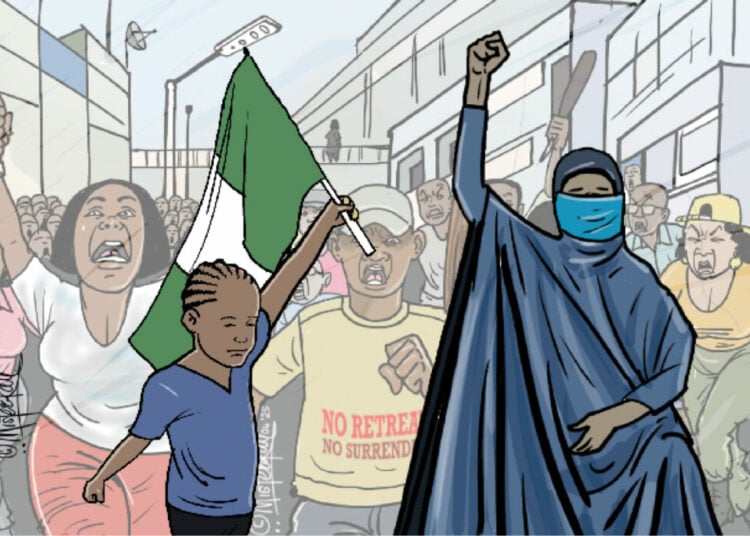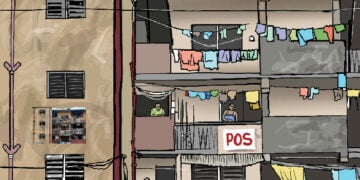On October 20, 2020, thousands of young Nigerians staged one of the most consequential civic uprisings in the country’s democratic history. Under the banner of #EndSARS, they protested not only police brutality, but also the larger architecture of injustice, inequality, and bad governance that has long eroded trust in public institutions. Their demands were direct and reasonable: stop the indiscriminate violence inflicted by the Special Anti-Robbery Squad (SARS), reform the policing system, ensure accountability, and protect the dignity of every citizen.
Five years after the shootings at the Lekki Toll Gate, the nation stands at a paradoxical crossroads. The memory of the protest remains vividly alive in the hearts of those who marched. Yet the state has done everything within its power to deny, diminish, distort, and ultimately erase the facts of that historical moment. This deliberate culture of forgetting poses a profound threat to justice, healing, and national learning. It is a quiet continuation of the violence that young protesters set out to confront.
The government initially acknowledged wrongdoing by announcing the disbandment of SARS. Panels of inquiry were set up across several states to investigate human rights violations. Testimonies were emotional and painful. Findings were documented. Recommendations were issued.
Nothing much has come of them. Instead of justice, some panel reports were withheld from the public, compensation processes stalled or politicised, the officers implicated in abuses faced no known consequences and the conditions that made SARS possible persist in various policing units.
Nigeria returned to business as usual, leaving the victims suspended in a limbo between trauma and gaslighting. The refusal to deliver accountability has created a dangerous precedent: state violence can be deployed without institutional consequence. Justice has become a luxury, not a right.
A Generation That Refused Silence
What distinguished the #EndSARS protests from past social movements was the unmistakable energy and leadership of young people. Digital natives, connected through hashtags and driven by a collective outrage, transformed social media from a place of complaint into a platform for nationwide coordination.
They were unified across class, tribe, age, gender, religion, and geography.
These young citizens demonstrated what effective national solidarity could look like. They organised medical teams, mental health services, legal aid, food relief and even sanitation. Crowdfunding substituted for a state that had long abdicated its responsibilities. The world watched Nigerians redefine civic engagement through innovation and empathy. The protests asserted young people’s refusal to inherit a future shaped by violence and neglect.
October 20 remains one of the darkest dates in Nigeria’s democratic trajectory. Protesters waving the national flag and singing the national anthem were confronted with bullets and brute force. Live streams captured what would become globally acknowledged evidence of state violence. Families lost children. Lives were permanently altered. Hope was shaken.
In the aftermath, the reaction of the state did not reflect remorse or accountability. Instead, there was a coordinated narrative of denial, attempts to frame the protests as treasonous, arrests, intimidation, and the weaponisation of public institutions to harass organisers and supporters. Victims were forced to prove the violence that everyone had seen.
The message of October 20 was chilling: citizen protests, even when peaceful, could be treated as an existential threat to power.
Memory, Truth and the Politics of Erasure
Alongside institutional failure lies an even more insidious trend: erasure. The state has invested in forgetting as an official policy approach. The symbols of the struggle have been targeted. Memorial gatherings and wreath laying are met with armed police presence. Activists are detained or harassed. The mere act of remembrance is treated as sedition.
This form of violence is quiet, but destructive. Societies that cannot acknowledge painful truths are doomed to repeat them. Silence becomes complicity. Without memory, there is no accountability. Without accountability, democratic trust withers. To forget #EndSARS is to abandon the value of human life and dignity in governance.
#EndSARS did not happen in isolation. It erupted in response to decades of structural decay. Still, poverty remains widespread, with youth bearing the brunt of economic collapse; corruption continues to undermine public trust and service delivery; education and unemployment crises fuel frustration with the state; and insecurity has expanded across regions, leaving citizens feeling unprotected.
Young people are confronted daily with a contradiction: they belong to a country rich in talent, resources, and human potential, yet governed in ways that constrain opportunity and threaten survival. The protest was a loud declaration that Nigerians deserve better.
Despite repression, young Nigerians have not stopped pushing for change. Social innovators continue to develop platforms for legal aid, policy advocacy, civic education, and technology-driven accountability. Journalists and independent media outlets persist in documenting abuses. Artists, musicians, and filmmakers embody memory through storytelling. Diaspora voices amplify calls for justice.
A generation that has experienced state violence at close range is also building alternatives to state failure. However, activism has come at a steep cost. Many who played frontline roles have endured: passport seizures and travel bans, frozen bank accounts, surveillance and intimidation, forced exile and career ruin or economic hardship. These punishments signal a democracy afraid of its own citizens.
Memory as Resistance
Despite the state’s efforts to erase #EndSARS, Nigerians continue to remember. Parents remember children they will never hold again. Survivors remember the gunfire that met peaceful chants. Citizens remember believing, briefly, in a country united by justice and shared purpose. Memory is political. It is an act of courage, not nostalgia. It demands action grounded in truth and insists that lives lost cannot go unaccounted for.
SARS may have been dissolved in name, yet abusive policing endures in new uniforms. Nigeria still lacks independent oversight, transparent prosecution of implicated officers, strong safeguards against torture and arbitrary detention, and proper support and compensation for victims. The system has been rearranged rather than reformed. Impunity remains entrenched.
The institution has been rearranged, not reformed. The culture of impunity remains deeply rooted. A credible national response requires more than rhetoric. It requires will. Five years after #EndSARS,
Nigeria’s path forward should involve a national acknowledgement of October 20, full disclosure and implementation of inquiry panel reports, transparent prosecutions, reparations and support systems, comprehensive policing reform, protection of the civic space, and institutionalising youth participation.
To heal, Nigeria must invest in justice. To progress, it must restore its social contract with young people. #EndSARS awakened a national consciousness that will not easily return to sleep. A generation that once feared power has become a generation unafraid to confront it. They have learned that democracy must be demand-driven, not gifted from above.
Nigeria’s leadership faces a critical moral test. Choose denial, and the country risks more eruptions of public anger. Choose accountability, and the country could begin a process of reconciliation that strengthens institutions and rebuilds trust.
Five years later, Nigeria stands in memory of forgetting. Yet memory continues to fight back. Young Nigerians still believe in a country worthy of their courage. They refuse to abandon those whose lives were cut short. They insist that justice must be more than a slogan.
To honour #EndSARS protesters is to build a nation where citizens do not fear those sworn to protect them and where democracy reflects dignity and fairness. The country must remember, account, and change. History will measure Nigeria by how it confronts the truth. Memory is only the first step. Justice must follow.





